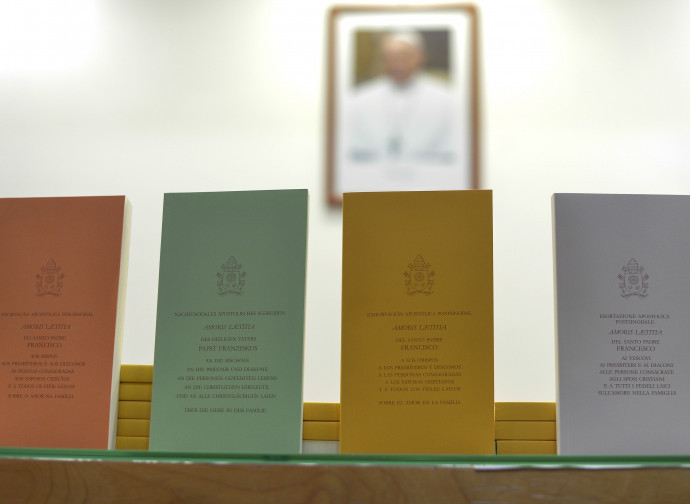Luther exalted by Italian Bishops’ daily as precursor of Amoris Laetitia
The Italian Bishops Conference (CEI) daily newspaper Avvenire, exalts the "surprising convergences" between the German reformer and the 2016 exhortation on the family written by Pope Francis. A praise that confirms doubts and dubia about the heterodox mentality behind certain 'openings'.

Many, including the author, have argued that the exhortation Amoris laetitia, written by Francis in 2016 after the biennial synod on the family, is a text that is open to the demands of Lutheran Protestantism. This assessment is now also confirmed by the Italian Bishops Conference daily newspaper, Avvenire, not to express perplexity or to make an issue of it, as has occurred on other occasions, but to appreciate it. The article even says that Martin Luther was prophetic and anticipated what the Church has finally discovered in 2016.
The article in question, signed by Luciano Moia, recalls that next year will be the 500th anniversary of Luther's marriage to Katharina von Bora, who, like Luther, had left the religious life. This event has inspired the theologian Francesco Pesce to publish the book Il matrimonio a Wittenberg (The Wedding at Wittenberg) for Marcianum Press which is an anthology of Martin Luther's texts. It is from this book that Moia takes his cue, quoting several Lutheran passages on marriage, addressed to "Dear Kathe", and drawing his conclusions about the "surprising intersections" between Luther and Amoris laetitia. Moia's approach has many formal flaws: he uses ambiguous prose, he rhetorically picks on the 'Counter-Reformation Vulgata' without specifying what it is about, he stakes everything on a few 'sentimental' rather than theological statements of the Lutheran texts quoted, and it is all suffused with the commonplace of looking for what unites us rather than what divides us, according to the approximate ecumenical language.
Apart from these aspects of expression and tone, there are some unacceptable points in this new conciliarist attempt. One of them concerns the theme of the “gradualness of matrimony" which is presented in Moia's article as a feature common to both Luther and the Exhortation. By gradualness in marriage, the writer and the theologian Pesce, on whom he comments, mean the limits, the imperfections and the situation of sin in which man finds himself in any case, that is, the evil present in the conjugal existence, in which, however, God preserves the good. More precisely, the gradualness of marriage means that it is by no means a perfectly instituted reality, that it is not definitively established in its essence, that it does not have a "nature" of its own that remains so in spite of human imperfections. Marriage cannot be 'gradual', marriage is not a process, it is a reality, the two are one flesh in a definitive way and not dependent on their existential development; marriage, once ritually consummated, is no longer available. Moia and Pesce are right to say that the gradualness of marriage is present in both Luther and Amoris laetitia, but this is a major problem with the exhortation.
Gradualness process. This gradualness argument was already contested at the time of the Synod on the Family (2014-2015) by many professors of the John Paul II Institute for Marriage and Family Studies. Unfortunately, with poor results then and even more so today, as can be seen in this article. The idea is to rethink marriage as an "ideal" and not as a sacrament that confirms and purifies a natural reality (we will return to this aspect of the natural character of marriage later). If it is an ideal to be attained and not a reality that constitutes the spouses as such, one may be further or further behind in attaining it, but under no circumstances can one be outside of it. Moreover, the commandment not to commit adultery would lose its imperative nature as a duty of divine right, because it would be seen as linked to the existential limits that are inevitable along the process, which can have advances but also setbacks, without excluding anyone. Everyone remains 'in'. In the face of marriage as an ideal, sin changes its meaning and becomes a weakness experienced along the way. We are in the presence of a revolution in sacramental and moral theology, which is also contained in Amoris laetitia.
Another point in the article must also be condemned for the seriousness of the inaccuracies it contains. Moia quotes Pesce, who says that "it is the sacrament that makes human love between a man and a woman indissoluble", so that the reason against divorce would only be sacramental, whereas Luther, "by affirming that marriage cannot be dissolved, even though it is not a sacrament, gives the qualification of indissolubility to human love per se".
Let us leave aside the historical aspects of this dubious Lutheran defence of indissolubility in order to consider the theoretical and doctrinal aspects. The indissolubility of marriage is also based on the nature of marriage, and then certainly even more so on its sacramentality. St Thomas, for example, lists the five natural reasons why marriage is monogamous and the six natural reasons why it is indissoluble. The Moia/Pesce thesis is an invented and unsubstantiated thesis that removes the natural dimension from the question and separates the natural from the supernatural, which is what Amoris laetitia does. An excellent example of Lutheran Protestantism.
Blessing without converting: the model is Amoris laetitia
Fiducia supplicans only crowns the so-called "via caritatis", the delusion of saving the sinner by excusing sin. It’s a method which has been in place for years that conceals an old error already denounced by Pascal.
